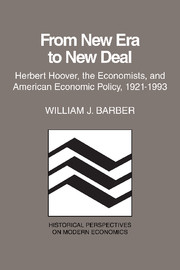Book contents
- Frontmatter
- Contents
- Preface
- Prologue: The vision of a new era in the 1920s
- 1 The ingredients of a model of a new economics
- 2 Challenges to the new economics of the 1920s
- 3 The new economics at center stage in 1929
- 4 Activating the stabilization model in late 1929 and 1930
- 5 Preliminary readings of the results of the stabilization strategy
- 6 The unraveling of the first official model in 1931
- 7 Shifting course in late 1931 and early 1932
- 8 Renewing the offensive in February and March 1932
- 9 The economists and their views on policy for 1932
- 10 Official model II as shaped in May 1932 and the aftermath
- Epilogue: Transition to the New Deal – continuities and discontinuities
- Notes
- Selected bibliography
- Index
2 - Challenges to the new economics of the 1920s
Published online by Cambridge University Press: 19 October 2009
- Frontmatter
- Contents
- Preface
- Prologue: The vision of a new era in the 1920s
- 1 The ingredients of a model of a new economics
- 2 Challenges to the new economics of the 1920s
- 3 The new economics at center stage in 1929
- 4 Activating the stabilization model in late 1929 and 1930
- 5 Preliminary readings of the results of the stabilization strategy
- 6 The unraveling of the first official model in 1931
- 7 Shifting course in late 1931 and early 1932
- 8 Renewing the offensive in February and March 1932
- 9 The economists and their views on policy for 1932
- 10 Official model II as shaped in May 1932 and the aftermath
- Epilogue: Transition to the New Deal – continuities and discontinuities
- Notes
- Selected bibliography
- Index
Summary
The doctrine developed by the Hooverites in the 1920s was ambitious in its claims that a new economic order could be built in the United States and daring in its insistence that the orthodox “laws” of economics could be repealed through informed manipulation. It is hardly surprising that the various components of this model of a new era should attract critics. Some of the attacks came from the governmental insiders who read the priorities of economic policy quite differently. Other critiques were presented by academicians on the outside. The skeptics, however, did not speak with one voice. While they could ally as disputants to arguments advanced by the advocates of the “new economics,” the objectors did so for diverse reasons.
Critiques of the analysis of productive efficiency
In the vision of the Hooverites, it was taken as axiomatic that two types of measures were important to the advancement of efficiency in the production process: (1) governmental support for the collection and distribution of relevant economic data and (2) governmental guidance to producers on best practices to reduce costs and to minimize wasteful product differentiation. Neither of these articles of the new faith won universal endorsement, however.
Within the government, the Department of Justice had put on record its reservations about Hoover's position on the work of trade associations. The rulings of the Supreme Court in 1925 had largely resolved this matter at the official level in Hoover's favor.
- Type
- Chapter
- Information
- From New Era to New DealHerbert Hoover, the Economists, and American Economic Policy, 1921–1933, pp. 42 - 64Publisher: Cambridge University PressPrint publication year: 1985



